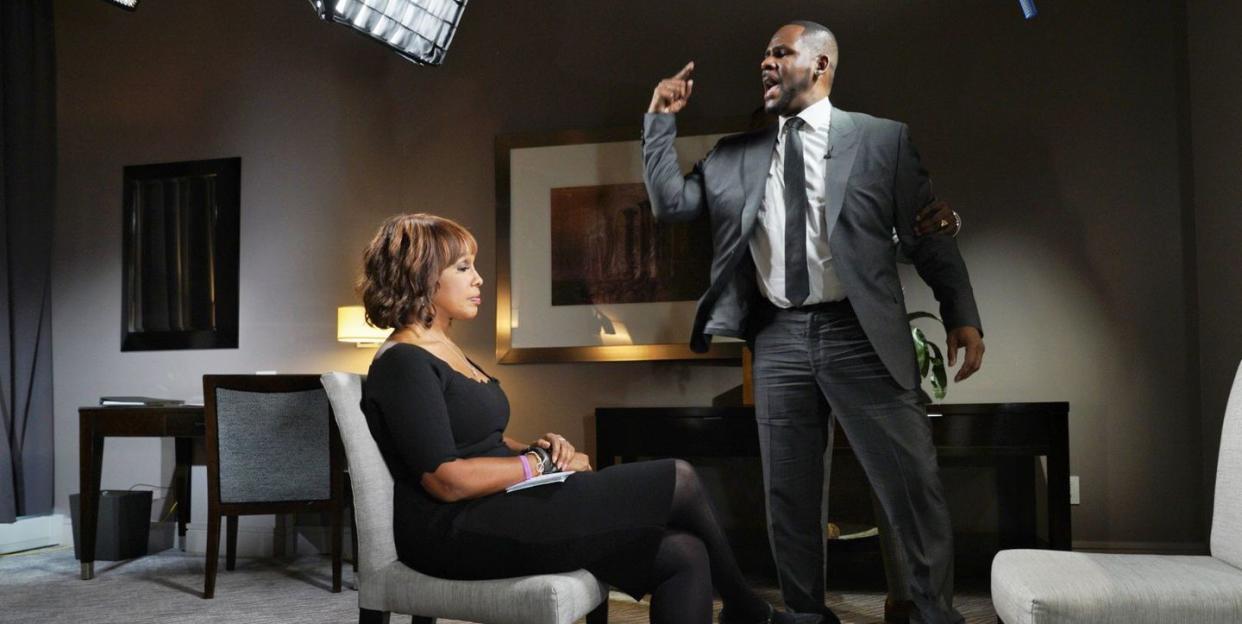Why Do Men Like R. Kelly Melt Down?

In a shocking new interview with Gayle King on CBS This Morning, accused sexual predator R. Kelly cried, yelled, and jumped out of his seat in anger.
The on-camera discussion, which taped for nearly 80 minutes, was the first time the singer had spoken out since being charged with 10 counts of aggravated criminal sexual abuse, to which he's pleaded not guilty. Kelly also vehemently denied any criminal wrongdoing to King in the sit-down.
"Y'all killing me with this shit!" he screamed when she asked about the charges. Then he threw his arms in the air and began beating his chest. "I gave up 30 years of my career," he said, tears streaming down his face. "30 years!"
As many Twitter users pointed out, the alternately angry and tearful ordeal felt all too familiar. In September 2018, Supreme Court Justice Brett Kavanaugh, then a nominee, had a similarly emotional reaction while defending himself from multiple allegations of sexual misconduct in front of the Senate Judiciary Committee. With a furrowed brow and a wave of his hand, Kavanaugh snarled at the accusations lodged against him. He remained agitated and angry for much of his 40-minute opening statement, and lashed out about his family's suffering because of the hearing. Then, he cried.
Why is it that high-profile men accused of misconduct react so explosively in these situations? We spoke to Dr. Christopher Kilmartin, a professor emeritus of psychology at the University of Mary Washington and author of the book The Masculine Self, to learn more about the alleged perpetrators's pattern of behavior under pressure.
Kelly and Kavanaugh displayed similar reactions to being questioned about their individual allegations. Tears, indignation, anger, deflection. Is that typical?
Remarkably typical, yes. What they're doing is painting themselves as innocent people to deflect attention away from the actual complaint. If somebody reports you for a wrong doing, now you're in an adversarial kind of situation and what do you do with adversaries? You attack them.
So, it's a tactic.
It's defensive and it's also manipulative and it's strategic and sometimes it's unconscious. In high profile cases like this, they do it to manipulate public opinion or, in court, to manipulate a jury.

This sounds like Dr. Jennifer Freyd's "DARVO" theory, developed in 1997 about the reaction sexual offenders perpetrators can display in response to being held accountable for their behavior.
Freyd coined the acronym DARVO, which stands for "Deny, Attack, and Reverse Victim and Offender." The steps are basically like, "I didn't do it, how dare you, and I'm the victim here." We see that very clearly and it suggests that the alleged offender is casting doubt on the person reporting the offense. As Freyd points out, it wouldn't work if so many people didn't believe that women routinely lie about these things anyway, so it preys on the myth that false reporting is common.
Look at Donald Trump's reaction to #MeToo, which is, "it's tough being a man these days." That's reverse victim and offender, too.
That aligns with Kelly's attack on the credibility of the women accusing him, by condemning them as "liars." If the accused truly believe they're innocent, or actually are innocent, does their reaction change?
Sometimes in the mind of the offender, they had consent and therefore can very sincerely believe that they did nothing wrong. They may actually believe that the victim was consenting, when in fact they were not, and therefore are outraged at this injustice rather than trying to understand what the victim is going through.
Do these emotional outbursts prompt feelings of confusion or self-blame for survivors?
Definitely. And, separately, I think if you're [a survivor and] watching this on television, there's a multitude of responses. On the one hand, look at Anita Hill, who empowered a lot of women to step up and to speak up. On the other hand, it probably got a lot of women thinking, "Well I don't want to be treated like her, so I'm going to keep my mouth shut."
It's a very difficult choice and a very personal one to speak out. Sometimes, one of the factors involved in the decision to open up is, "I don't want this person to hurt anybody else because I know how much he hurt me." That's more of a collectivist, more of a social justice, kind of orientation.
This interview has been lightly edited and condensed.
('You Might Also Like',)

